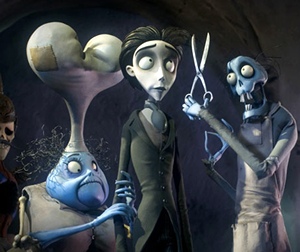Wise: Howdy, Werth. Do you happen to know if there's a Hot Topic here in Manhattan, or do I need to head to a mall somewhere in New Jersey?
Werth: Are you all out of black nail polish and fishnet tights?
Wise: Of course not, but I do need some supplies to get my goth fangirl on because Tim Burton's latest stop-motion animation film Frankenweenie opens today. This calls for a new Emily the Strange lunchbox!
Werth: More than that, Wise. It calls for a Film Gab salute to the multiple stop-motion animated films in Burton's oeuvre.
Wise: I couldn't agree more. Corpse Bride (2005) relates the unlikely tale of Victor Van Dort (Johnny Depp), the shy son of arriviste fish merchants who is pledged to marry the daughter of a titled but broke noble family (Emily Watson as a very plucky Victoria Everglott) only to have those plans interrupted by an accidental union with the titular decomposing lady (Helena Bonham Carter).
The plot revolves around Victor's attempts to escape the underworld and reunite with his true love Victoria while Corpse Bride Emily attempts to persuade Victor of the many charms of the afterlife.
Werth: Sounds like the presidential debate this week.
Plus, there's genuine humor, including Emily's maggot conscience that bears a striking resemblance to Peter Lorre.
Werth: Everyone should have a Peter Lorre maggot as a conscience.
Wise: Depp is marvelous as a self-doubting introvert who gradually learns to express his emotions and to fight for his passions. Watson has less to do, but is no less appealing as a damsel in distress who finds she has a lot more fortitude than anyone gave her credit for.
Bonham Carter resurrects some of the spunky innocence she displayed as an ingenue in all those Merchant and Ivory films at the beginning of her career, but marries it to a macabre sexpot glamor that makes her the darling of the black eyeliner set.
Werth: I bet her wardrobe at home looks more like the Corpse Bride's than Miss Honeychurch's.
Wise: Of course, no discussion of Corpse Bride would be complete without mentioning Danny Elfman's rollicking score. He somehow manages to make his music appropriate to both Burton's gaudy Halloween world and to the characters' emotional lives. He also provides the singing voice to Mr. Bonejangles, a one-eyed dancing skeleton (and a sly nod to Sammy Davis, Jr).
The supporting players are uniformly great, filled with a roster of British talent that includes Joanna Lumley, Richard E. Grant, Michael Gough, and Christopher Lee. But it's all these talents together, harnessed by Burton and Johnson that makes Corpse Bride such a pleasure.
Werth: Frankenweenie and Corpse Bride may be his most recent forays into the world of stop-motion animation, but Burton has been working in the world of puppets and clay from his first days as a director. One of his first shorts made for Disney which you can catch on the Special Edition DVD of The Nightmare Before Christmas (1993) (which Burton produced but didn't direct) shows exactly where this talented artist was going. Vincent (1982) is a darkly charming, black and white animated poem about a young boy named Vincent Malloy who wishes he was Vincent Price.
Wise: Like Bill Hader wishes he was Vincent Price.
Werth: Minus Gloria Swanson and James Mason. Vincent's imagination is a joyous trip into the macabre with little Vincent turning his mom into a waxwork, scouring dark alleys with his zombie dog, and realizing that his wife has been buried alive... all to narration spoken with a twinkle of irony by the one and only Vincent Price.
Wise: I guess Orson Welles was busy.
Werth: What really makes this piece so unique is its impeccable design, which Burton did himself. The textures of the clothing and hair, the wild expressionism-by-way-of-Dr. Seuss sets, the cinematic lighting, even the little bags under Vincent's eyes are created with painstaking attention to detail.
All of these qualities would make their way into Burton's stop-animation scenes in Pee-Wee's Big Adventure (1985) and Beetlejuice (1988) and his visionary production of The Nightmare Before Christmas (1993) and James and the Giant Peach (1996) (both directed by Coraline director, Henry Selick.)
Wise: So, Werth, I've got my ironic My Little Pony t-shirt and my wallet chain, and I'm ready join you at Frankenweenie.
Werth: Who cares what you're wearing, as long as you join me next week for more Film Gab.











































